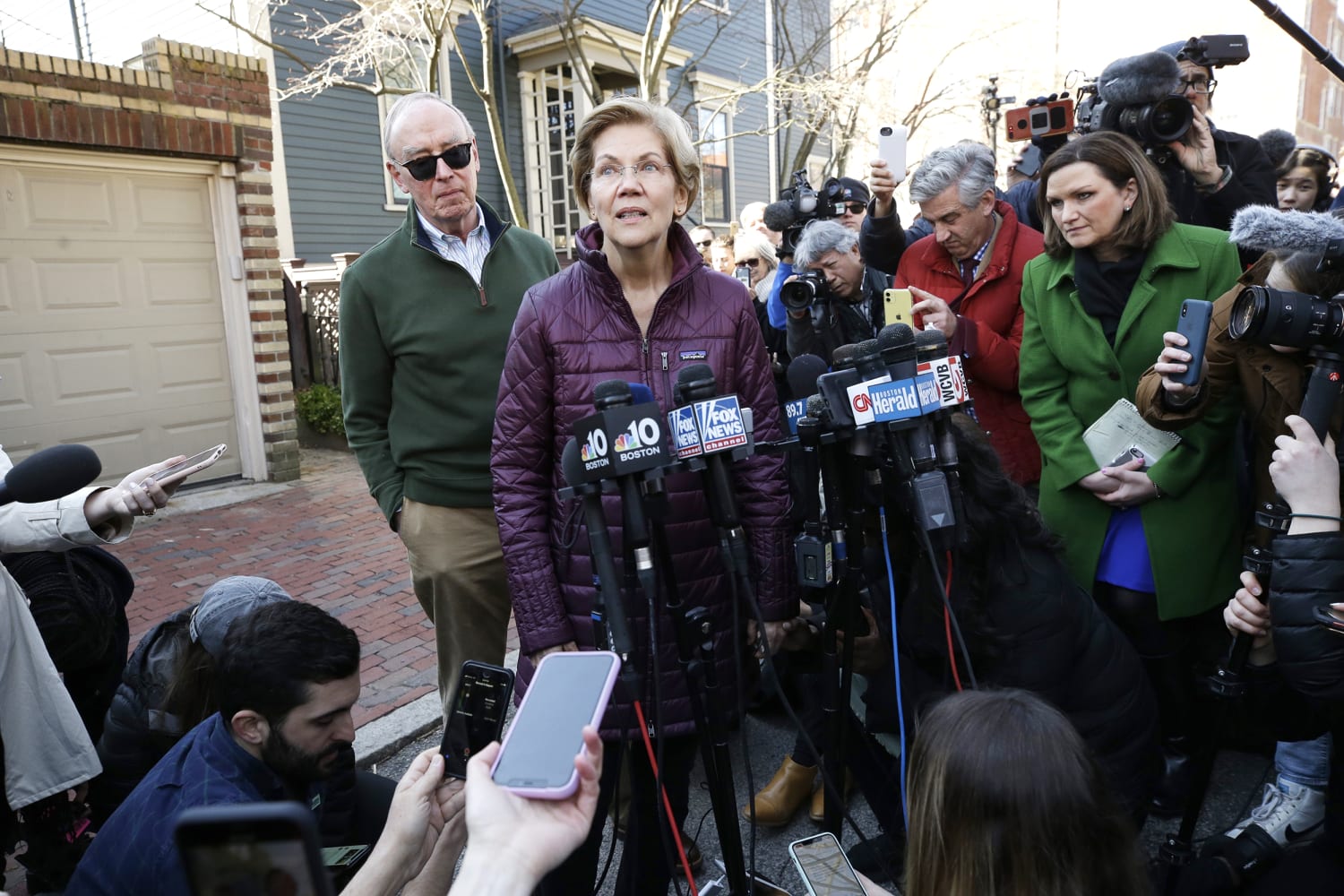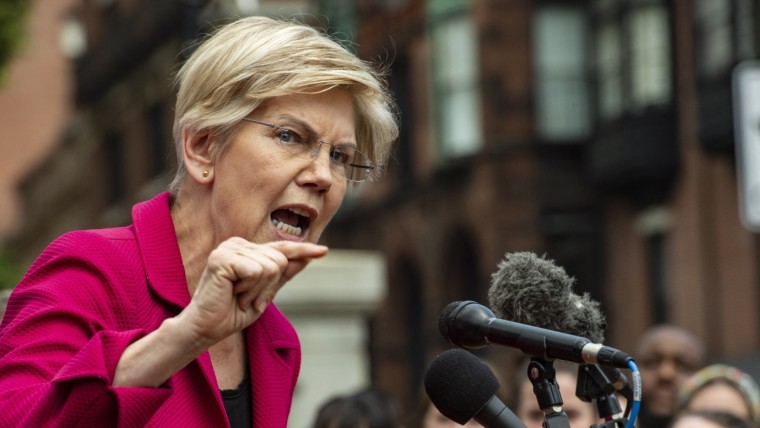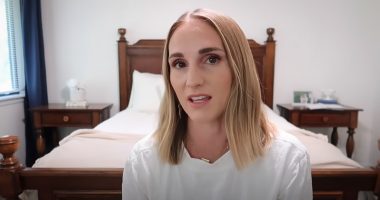This is an adapted excerpt from “Electable: Why America Hasn’t Put a Woman in the White House … Yet,” a book by Ali Vitali, Capitol Hill correspondent for NBC News. The book, published Tuesday by Dey Street/HarperCollins, investigates the gendered double standards faced by the female candidates who ran for president in 2020 and answers the larger questions: Why have women struggled to break this glass ceiling — and when will they?
“What if you don’t win here?”
I could sense instantly that Sen. Elizabeth Warren was less than thrilled with my question.
New polling showed Warren neck-and-neck with Vermont Sen. Bernie Sanders here in her home state of Massachusetts, and the Sanders campaign had just made a big show of campaigning — with a big crowd — on Warren’s turf days before the biggest delegate haul of the 2020 Democratic presidential primary: Super Tuesday.
“Why would you ask me a question like this at the beginning of the morning when we’re going down to vote?” Warren said, her voice high and tight, betraying an uncharacteristic tone of irritation. I felt like I was a kid in trouble. There had been some tense news cycles this campaign, but this was the first time she’d shown outright annoyance at one of my questions.
Warren had only one option: She had to win here — or anywhere! — on Super Tuesday, because she had yet to do so and because everyone knew her campaign was in trouble. This was it. The last chance for a candidate trying to find a lane somewhere between moderate Joe Biden and progressive Bernie Sanders.
Covering a candidate is exactly like being in a really overbearing, one-sided relationship.
“This is the best part,” she finally answered. Her sternness dissipated with each word, regaining the usual brightness that rounded out her tone as she headed to her polling station. “This is the best part of democracy.”
“Thank you, senator,” I said, shimmying off the uneven brick sidewalk and trying not to wrap myself, or anyone else, in the cord that connected my microphone to my camera crew.
Super Tuesday was no exception to the near-daily gaggles I’d become accustomed to with the senator. I’d also gotten used to her always looking to me first when we assumed our usual positions in the gaggle. It was both a basic way of signaling that she expected to hear from me — I always had a question to ask, after all — but it was also a way of shifting a stereotypically male process in favor of the women in her press corps.
Scrums and gaggles favored the loudest and most aggressive reporters. The ones who could physically push to the front of the pack (which, at five foot two, I was great at) and the ones who commanded attention when they shouted for the candidates’ attention. “Senator! Governor! Mr. President!” It was a chaotic process that often lent itself to, and rewarded, stereotypically male traits.
Warren was hyper aware of those dynamics, and I was often struck by the way she leveraged her power as the candidate to empower the women who covered her to get their questions answered. She didn’t favor us, but she did make sure the field was level. More than once, she stopped male reporters with their deeper and louder voices from talking over me.
On one occasion when she’d already called on me and I was halfway through asking my question, a male reporter from a local station physically put his microphone (and arm) over me and just started in on his query. “I’m talking to Ali now,” she told him, retraining her eyes on me and ignoring his stunned silence. I’d never seen a candidate do that before.
But that night of Super Tuesday, Biden’s sweep of the electoral map was stunning. Democratic voters who had resisted any kind of cohesive coalescing for a year had, in the 72 hours after Biden won South Carolina, decisively lined up behind him. As did all the other candidates who were onetime Biden alternatives — Amy Klobuchar, Pete Buttigieg, Beto O’Rourke — who lined up to endorse him, furthering his air of inevitability. Apparently one win after losses in Iowa, New Hampshire and Nevada was all it took to affirm Biden’s long-talked-about electability.
Warren, in the end, netted dozens, not hundreds, of delegates on Super Tuesday. She lost her home state, not to Bernie Sanders but to Biden — who had no campaign infrastructure in the Bay State and hadn’t even set foot there to campaign yet earned 33.6% of the vote to Warren’s 21.4%. On MSNBC and CNN, it was over. The cable narrative had moved on to the victorious Biden news cycle it had been storing up for months.
From the corner across from Warren’s house, I watched notifications roll in that former New York City Mayor Michael Bloomberg was dropping out. His spend-everything-but-campaign-little approach had failed. Several strategists texted to point out (and gloat) that Warren had outlasted him, basking in whatever glory they could get given the glum mood over Warren World.
When I finally got back to the hotel that night, I showered and collapsed into bed. But the anxiety over the news still to come kept me lying awake. This was all ending tomorrow. It had to. I didn’t know that yet, but I knew it. And knowing the end was coming didn’t make it any easier.
I was often struck by the way she leveraged her power as the candidate to empower the women who covered her to get their questions answered.
Because here’s the truth about my job: Covering a candidate is exactly like being in a really overbearing, one-sided relationship. You think about them all the time, you talk about them constantly, you wonder what they’re doing when you’re not around. When you’re not with them, you’re wondering when you’ll see them again. It’s bizarre. I’m paid to get to know these people. Their policies, positions and statements — absolutely. But also, what kind of person they are. Who the heck do they think they are to be president of the United States? Who are they, really?
The even more honest truth is sometimes you’re assigned to cover a candidate who you get to know and find you can’t respect. I’ve covered those candidates. But sometimes you also get assigned to cover candidates who you get to know, and you learn that they’re basically good humans. For my fellow Bachelor Nation members, they’re “here for the right reasons.”
They’re still politicians, and your job is still to vet them, but by and large you enjoy covering them because the person you’re following is challenging, intelligent and committed to bettering the country you’re both citizens of. That doesn’t mean they’re always nice; this isn’t about mean and nice. These are still politicians questing for power, and you’re still there to hold them to account. But while you’re doing that, you can also respect the good ones for what they bring to the table.
“I want all of you to hear it first,” Warren told hundreds of staffers on a call that Thursday, “and I want you to hear it straight from me: Today, I’m suspending our campaign for president.”
I don’t think I’ve ever felt more stressed. No, it wasn’t stress. It was pressure. I’d never felt the weight of another moment more. It was up to me to give the women who’d run for president in 2020 their due. Not to be complimentary, not to be overly harsh, just to show them for who they were as candidates: competent and qualified women.
As a reporter, I had watched the sexist dynamics in play — the subtle and the overt — and I was determined not to fall into those traps. As a feminist, I was committed to contextualizing this female moment in history. As a woman, I simply did not want to get this moment wrong.
After the all-staff call, Warren faced the press gathered in her driveway.
Warren said she had “a deep sense of gratitude for every single person who got in this fight, every single person who tried on a new idea, every single person who just moved a little in their notion of what a president of the United States should look like.”
That last thank-you sticks in my mind, even now: to those who moved their notion of what a president should look like, even just a little.
It was the ultimate answer to electability, one that Warren and her campaign never found in numbers large enough to matter while she was in the race. Neither they — nor Klobuchar, nor Kamala Harris, nor Kirsten Gillibrand, nor Tulsi Gabbard, nor Marianne Williamson — ever got Democratic primary voters to imagine what they’d never seen before enough to vote for it.
The skittishness, the risk-averseness and perhaps most of all the fear of four more years of Donald Trump had pushed Democratic voters toward what they’d seen 44 times already: a white male politician who Everyone-That-Knew-Anything said could win. A man who ran twice for president before and won no primaries in 1988 and 2008; who suffered through three bruising losses in the Democratic primaries this time around but won once, when it mattered, and never looked back.
Minutes later, The Washington Post’s Annie Linskey asked Warren about gender and the role it played in this race. A question they’d all been asked to grapple with in real time, now answered with a new freedom.
“That is the trap question for every woman,” Warren replied. “If you say, ‘Yeah, there was sexism in this race,’ everyone says ‘whiner.’ And if you say, ‘No, there was no sexism,’ about a bazillion women think, ‘What planet do you live on?’”
I felt the women around me silently nod. We all knew exactly what she meant. These were questions only female reporters would prioritize asking, and answers that only female reporters could contextualize correctly. It was refreshing and important. A sign of the kind of depth of coverage that more diversified press corps and newsrooms can bring to previously male- and white-dominated spaces.
But I also wondered afterward if maybe we were part of the issue. How we, as a nation and as a press corps, regularly ask women to beat the odds and the sexist barriers that are built into the presidential process, and then ask them how they managed to do it. Or we ask them why they lost but downplay the intangible magnitude of gender bias as part — not all, but part! — of the explanation. It’s almost like because gender’s impact is often unquantifiable, we shy away from talking about it in a meaningful way when diagnosing what went wrong. That Warren would engage with it here made sexism a thing we had to talk about as we mulled her exit from the race.
None of the women who ran in 2020 lost solely because of sexism. And none of them blamed sexism outright, either. That explanation wouldn’t have been true. But they all agree that it was part of what ultimately caused their campaigns to fail. And any explanation without that would be sorely lacking.
When Warren looked back with me on the end of her candidacy in a November 2020 interview, she didn’t lay blame with her issues or her team or the way she ran. By contrast, she seemed to lay the bulk of the blame with herself.
It’s almost like because gender’s impact is often unquantifiable, we shy away from talking about it in a meaningful way when diagnosing what went wrong.
“I felt so bad for them,” Warren told me of her staff, punctuating each word with a pause. “I felt like I failed. … So how do I say [to all these people on a staff call] ‘this is not our time, this is not what America wants’ — at least, as I carry it.”
Each “I” was pregnant and heavy. It struck me, talking to her then, that as Warren heaped the blame on herself, she took little comfort from what she had accomplished.
“Did it make you doubt, like maybe ‘I thought the country was ready for something that they weren’t ready for, on policy or on personality’?”
“On policy, no,” she answered quickly. “I believe, I really do, about what’s broken and what we need to do to fix it. I was the imperfect messenger. I couldn’t get it there.”
Climate change, systemic inequality, unequal access to opportunity. These, she told me in a much-truncated version of the speech I’d heard her give hundreds of times, were the issues that needed fixing and needed fixing now. “I felt this urgency around it. These are the things we need to do. If I couldn’t explain it well enough or get people engaged enough, that’s on me.”
In the aftermath of the Warren exit, it wasn’t just the candidate or her staff searching for a bright side. Many voters, especially women, were fighting against that crushing feeling of disappointment they had come to know all too well.
For many — those who supported Warren and those who didn’t — the Thursday afternoon that Warren dropped out felt like November 2016 all over again: a gut punch of a reminder that it would be at least another four years before another woman could have a shot at the White House. In some cases, the “heartbreak” was about Warren herself: the loss of an outspoken progressive with a pragmatic streak who really felt like she could get there. In others, it seemed like people realized they were, in fact, thirsty for female leadership — if only once they had lost the chance.
Source: | This article originally belongs to Nbcnews.com











